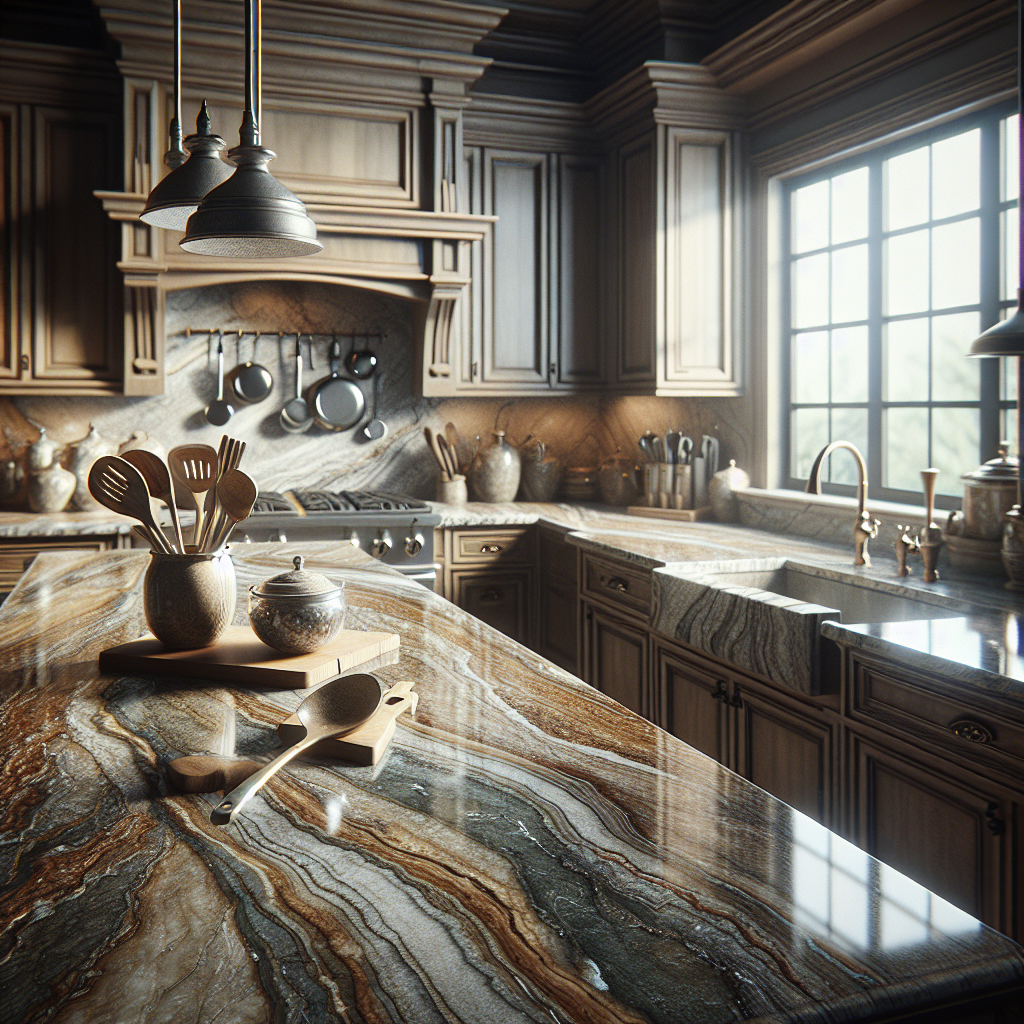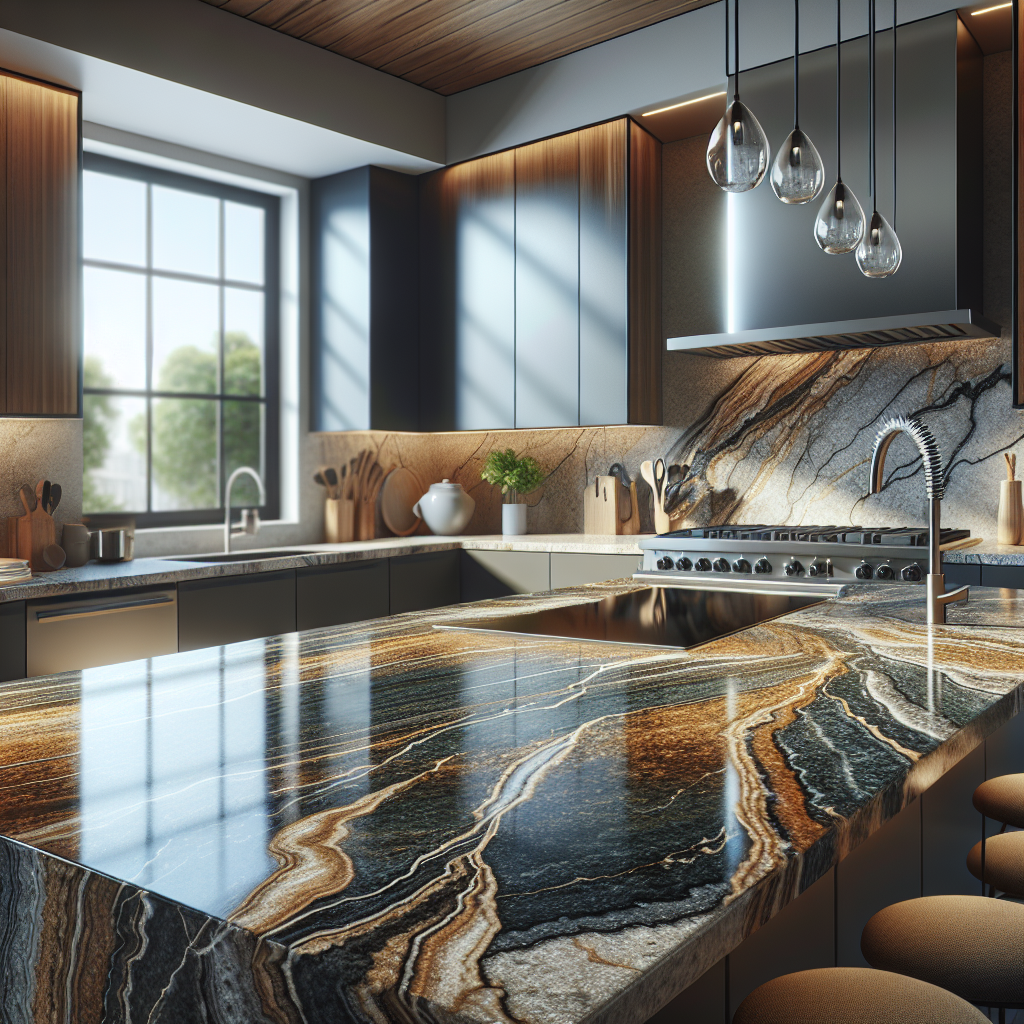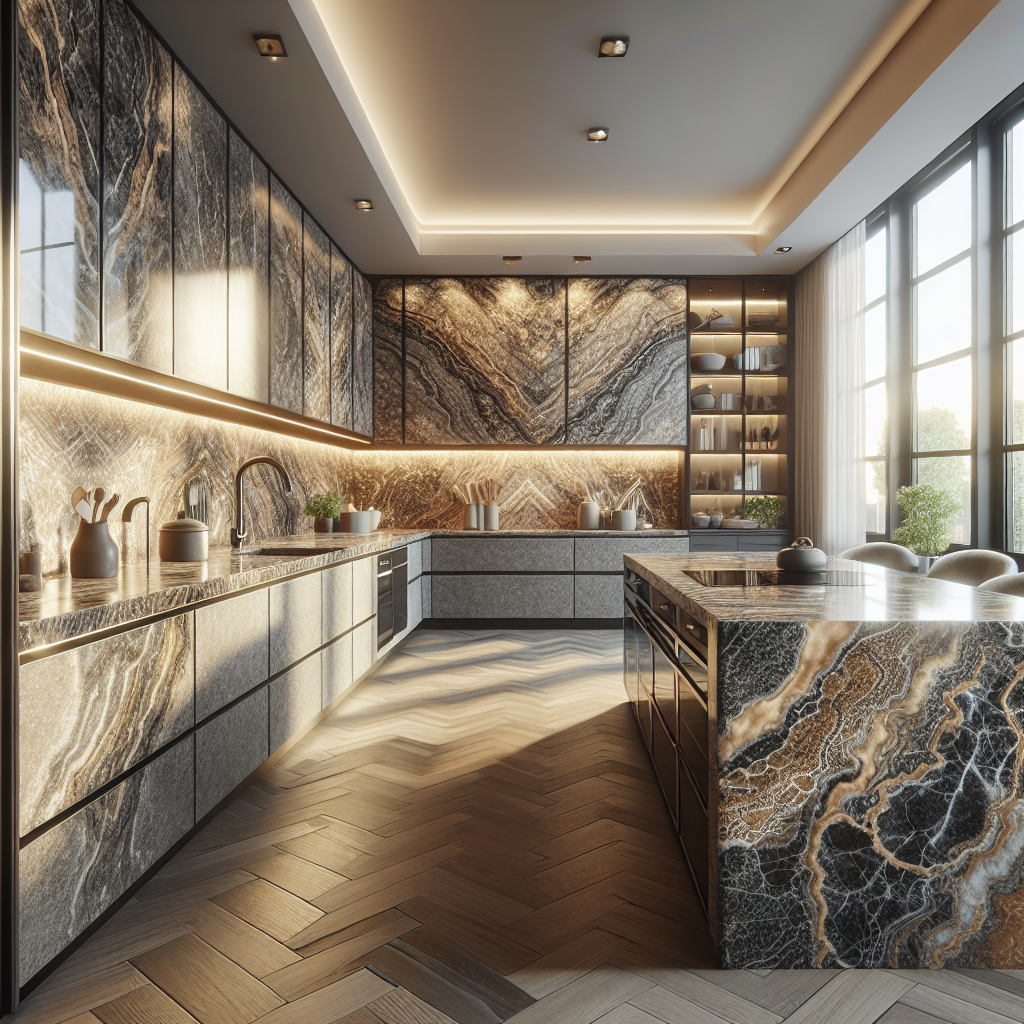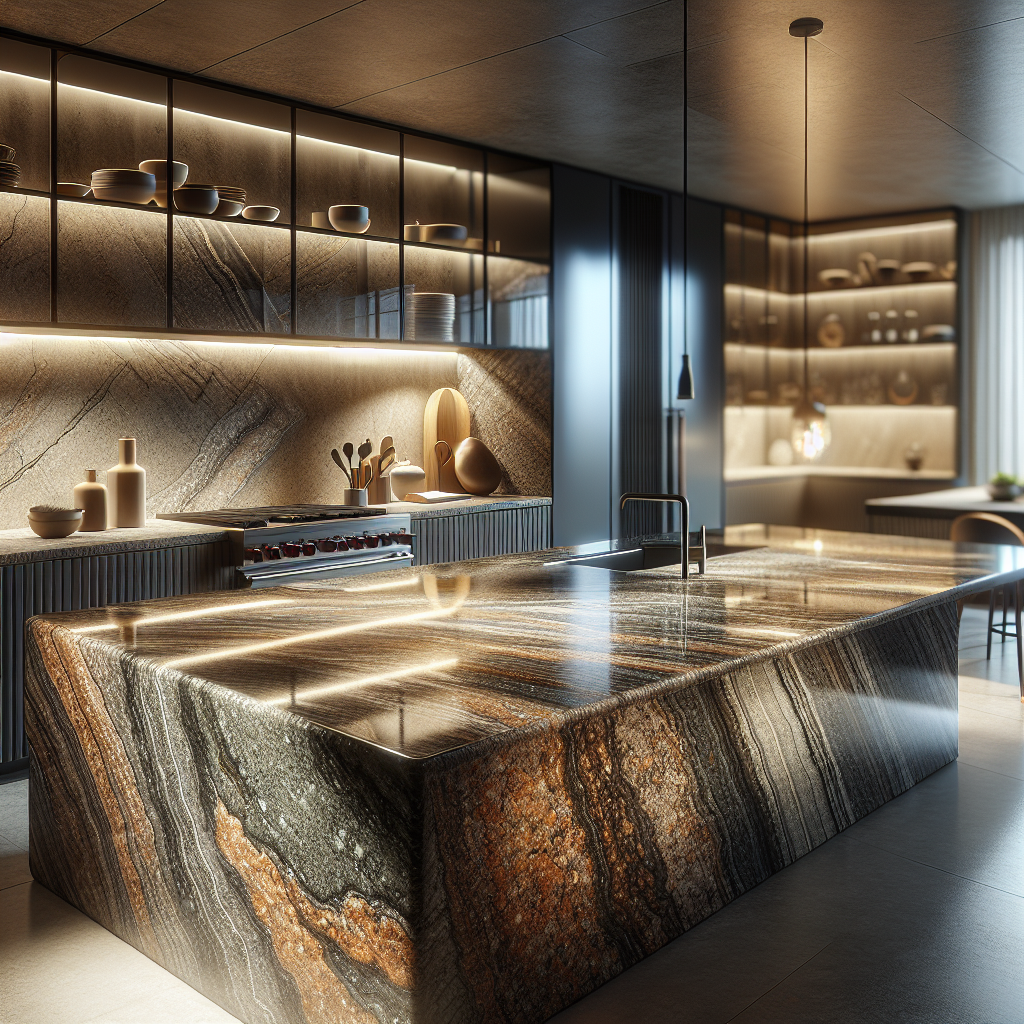Fabricated granite countertops are a blend of natural beauty and modern engineering, making them a preferred choice for many homeowners and contractors. Unlike raw granite slabs, which are mined directly from the earth, *fabricated granite* involves a meticulous process of cutting, shaping, and polishing to meet specific design and functional requirements. This process not only enhances the natural beauty of granite but also allows for custom designs that seamlessly fit any kitchen layout.
**Granite** itself is a highly durable and resilient stone, known for its resistance to scratches, heat, and stains. When fabricated, these qualities are further amplified, ensuring that your countertops can withstand the rigors of daily kitchen use while maintaining their luxurious appearance. The fabrication process involves precise measurement and cutting using advanced technology, followed by finishing techniques that accentuate the stone’s inherent patterns and colors.
One of the key benefits of opting for *fabricated granite countertops* is the ability to tailor them to your exact specifications. Whether you desire a particular edge style, thickness, or even a specific color pattern, fabrication allows for a high degree of customization. This ensures that each countertop is not only a functional work surface but also a unique statement piece that enhances the overall aesthetic of your kitchen.
For those in search of high-quality, customized kitchen countertops, **fabricated granite** offers an ideal solution. Its combination of beauty, durability, and versatility makes it a standout choice for any kitchen design. Call us today at (954) 781-7370 for a free quote!
Benefits of Choosing Granite Countertops

Choosing granite countertops for your kitchen offers a myriad of benefits that blend practicality with elegance. One of the most celebrated advantages of granite is its **remarkable durability**. As a natural stone, granite is incredibly hard, making it resistant to scratches and everyday wear and tear. This makes it an excellent choice for busy kitchens where surfaces are subjected to frequent use.
In addition to its durability, granite provides an undeniable aesthetic appeal. Each slab of granite is unique, featuring its own blend of colors and veining patterns, ensuring that no two countertops are alike. This natural variability allows homeowners to select a countertop that truly complements their kitchen design, adding a touch of personalized elegance.
Granite countertops are also highly resistant to heat and moisture. This is particularly beneficial in kitchens, where hot pots, pans, and spills are common. The heat resistance means you can place hot cookware directly on the surface without fear of damage, while its moisture resistance helps prevent stains and bacterial growth, contributing to a hygienic kitchen environment.
Moreover, the **long-term investment** value of granite countertops should not be overlooked. Their durability ensures that they remain looking new for decades, and they can significantly increase the resale value of your home. With minimal maintenance, granite countertops continue to provide beauty and functionality year after year, making them a wise choice for any homeowner looking to combine luxury and practicality in their kitchen.
Fabrication Process of Granite Countertops

The **fabrication process** of granite countertops is a meticulous and highly skilled procedure that transforms raw granite slabs into beautiful and functional kitchen surfaces. This journey begins at the quarry, where massive blocks of granite are extracted from the earth. These blocks are then transported to a processing facility where they are cut into slabs using diamond wire saws, a technology that ensures precision and minimizes waste.
Once the slabs are cut, they undergo a polishing process to enhance their natural beauty. This involves a series of grinding wheels with increasingly finer abrasives that smooth the surface and bring out the granite’s natural shine. The polished slabs are then inspected for quality, ensuring that they meet the high standards required for countertop use.
Next, the slabs are ready for customization to fit specific kitchen layouts. Advanced technology, such as **CNC machines**, is used to cut the slabs into desired shapes and create openings for sinks and other fixtures. This technology allows for precise cuts and intricate edge profiles, offering a range of design possibilities to suit any taste.
After cutting and shaping, the edges of the granite countertops are finished according to the client’s specifications, whether they prefer a simple straight edge or a more elaborate ogee edge. The final step involves sealing the granite to protect it from stains and enhance its longevity, ensuring that it remains a stunning focal point in any kitchen.
The end result of this detailed fabrication process is a custom granite countertop that not only elevates the aesthetic appeal of a kitchen but also provides a durable and functional surface that will last for years to come.
Maintenance Tips for Granite Surfaces

Maintaining your **granite surfaces** is essential to preserve their natural beauty and extend their lifespan. With proper care, granite countertops can remain a stunning feature in your kitchen for many years. Here are some key tips to help you keep your granite surfaces in pristine condition.
Regular Cleaning: To keep your granite surfaces clean, use a mild dish soap mixed with warm water and a soft cloth. Avoid using abrasive cleaners or scrubbing pads, as these can damage the surface. For daily cleaning, simply wipe down the countertop with the soapy solution and rinse with clean water, ensuring no soap residue is left behind.
Sealing: Granite is a porous material, and sealing it helps prevent stains and moisture from penetrating the surface. It’s recommended to seal your granite countertops once or twice a year, depending on the usage and the type of granite. You can test if your countertop needs sealing by pouring a small amount of water on the surface; if it absorbs quickly, it’s time to reseal.
Avoid Harsh Chemicals: Stay away from acidic or alkaline cleaners, such as vinegar, lemon juice, or bleach, as these can damage the sealant and dull the granite’s finish. Opt for pH-balanced cleaners specifically designed for natural stone surfaces instead.
Stain Removal: In case of spills, blot them immediately with a soft cloth to prevent staining. For tougher stains, a baking soda paste can be applied to the affected area, left for a few hours, and then gently scrubbed away.
By following these maintenance tips, you can ensure that your granite surfaces remain a durable and attractive centerpiece in your kitchen, enhancing the overall aesthetic and functionality of the space.
Comparing Granite with Other Materials

When selecting the perfect material for your kitchen countertops, understanding the differences between available options is crucial. **Granite** stands out among various materials for several reasons, but it’s essential to compare it with others like quartz and porcelain to make an informed choice.
Durability: Granite is renowned for its exceptional durability. It is a natural stone that can withstand high temperatures and resist scratches and dents. In comparison, **quartz** is engineered to be even more durable, offering resistance to stains and scratches while maintaining its non-porous nature. **Porcelain**, while also durable, can be more susceptible to chipping under heavy impact.
Aesthetics: Granite offers a unique, natural appearance with a variety of colors and patterns, each slab having its distinct character. This makes it an attractive choice for those seeking a one-of-a-kind look. Quartz provides a more uniform appearance and can mimic the look of natural stone with added options for vibrant colors. Porcelain offers a sleek, modern look and can be designed to resemble other materials, including marble and wood.
Maintenance: Granite requires regular sealing to maintain its resistance to stains, whereas quartz requires minimal maintenance due to its non-porous surface. Porcelain surfaces are also low-maintenance and highly resistant to stains and chemicals, making them easy to clean.
Cost: The price of granite can vary depending on the rarity of the color and pattern, often making it more expensive than quartz and porcelain. However, its natural beauty and durability can justify the investment. Quartz is generally more affordable and offers a similar aesthetic appeal without the need for regular sealing. Porcelain is often the most budget-friendly option, providing flexibility in design at a lower cost.
By weighing these factors, homeowners can select the countertop material that best suits their lifestyle, aesthetic preferences, and budget, ensuring a kitchen space that is not only functional but also visually appealing.
Choosing the Right Granite Fabricator
Selecting the right **granite fabricator** is a crucial step in ensuring your countertops meet your expectations in terms of quality, design, and installation. A skilled fabricator can make the difference between a standard kitchen and a stunning culinary space that reflects your individual style.
Experience and Expertise: The first aspect to consider is the fabricator’s experience and expertise. Experienced fabricators will have a portfolio that showcases a variety of completed projects, demonstrating their ability to handle different styles and complex installations. Look for fabricators who have a strong reputation in the industry and are known for their exceptional craftsmanship.
Quality of Materials: It’s important to choose a fabricator who uses top-quality granite slabs. Inspect their inventory and ensure they offer a wide selection of colors and patterns, enabling you to find the perfect match for your kitchen. The fabricator should be transparent about the origin and grade of their materials.
Technology and Equipment: Modern fabricators use state-of-the-art technology to ensure precision in cutting and finishing granite slabs. Ask potential fabricators about the equipment they use and how it contributes to the quality and accuracy of their work.
Customer Reviews and Testimonials: Reviews and testimonials from past clients can provide valuable insights into the fabricator’s reliability and service quality. Look for fabricators with positive feedback, especially regarding their attention to detail and ability to meet deadlines.
Pricing and Quotes: While cost should not be the sole determining factor, it’s wise to obtain detailed quotes from multiple fabricators to compare pricing. Ensure that the quotes include all aspects of the project, from material costs to installation fees.
Ultimately, choosing the right granite fabricator involves careful consideration of their experience, material quality, technology, and customer satisfaction. Selecting a trusted fabricator like **Absolute Marble and Granite** can ensure a seamless experience and a finished product that enhances your kitchen’s beauty and functionality. If you’re ready to transform your kitchen with exquisite granite countertops, call us today at (954) 781-7370 for a free quote! Visit us online at Absolute Marble and Granite to learn more.
